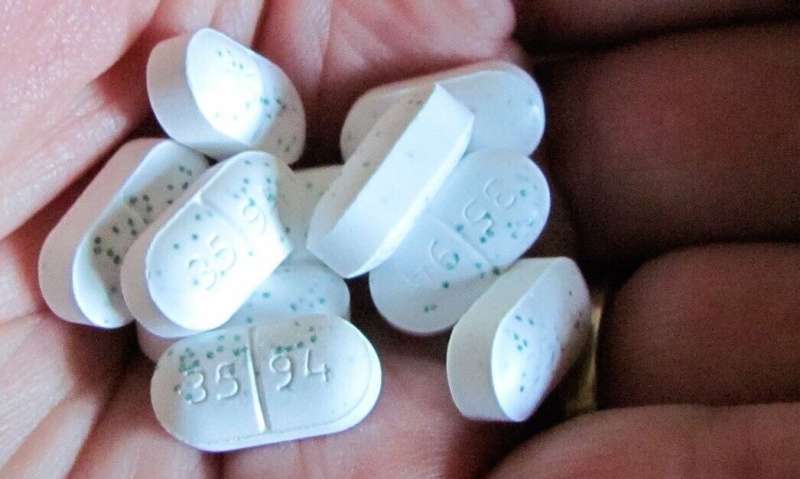Harmful medication re-exposures could be avoided with new approaches

Adverse drug events could be avoided by sharing patients' medication histories and previous harmful medication exposures among various health-care facilities. That's one of the key findings of a study published today in CMAJ Open.
Led by Vancouver Coastal Health Research Institute and UBC researcher Dr. Corinne Hohl, the study's conclusions are a wake-up call to urgently find new approaches to better protect the health and safety of patients.
"As the medical system improves how we treat and prevent diseases, we may be inadvertently putting patients on medications that previously caused harm, have already been identified as contraindicated, or on wrong medication doses," said Hohl. "This research study provides us with clues as to how we can reduce adverse drug events and their impact on health care by establishing a centralized and integrated system for reporting and accessing medication-related patient information."
Hohl practices emergency medicine at Vancouver General Hospital (VGH), is an associate professor in the department of emergency medicine at the University of British Columbia and is a scientist at the Centre for Clinical Epidemiology and Evaluation.
Hohl's study examined when medications were incorrectly re-prescribed and caused an unintended effect.
Using a patient's recorded chart history at Vancouver General, St. Paul's and Lions Gate hospitals, researchers tracked first occurrences of adverse drug events along with repeat events from the same medication or medication class. They found that among the almost 13,000 adult patients included in the study, 1,178 were diagnosed with 1,296 adverse drug events. Of these, more than one-third had a repeat adverse drug event, and almost 40 percent of those patients were admitted to hospital after being discharged from the emergency department.
Around 75 percent of repeat adverse drug events could have been prevented through better monitoring and communications, the study reveals.
"We identified a systems issue that requires information about patients' medications and medical history be made available at all points of service and to all health-care providers who are prescribing and dispensing medications," said Hohl. "Our results likely underestimate the problem because we could only capture what was recorded in patients' charts, and it is estimated that 94 percent of adverse drug events are underreported. While the focus of medical error prevention has largely been on reducing the number of clerical errors, our study points to a need to also focus on ensuring that patients get the right medication at the right time and at the right dosage, based on their medical history and how they previously reacted to medications."
Health authorities are moving to better integrate patients' medication history in their new clinical information systems.
Moving the dial on medication errors
A first step toward reducing the number of adverse drug events would be to boost reporting and recording procedures. Adverse drug events and other important medical information should live in a centralized database that can be accessed by all members of a patient's care team, including physicians, nurses and pharmacists.
Clinicians across the care continuum who access the centralized database could review a patient's medication and adverse drug event history. They could enter their recommended course of treatment, and an alert would appear if the medication to be dispensed was associated with a previous adverse drug event in the patient's file.
Each year, approximately 2 million Canadians will arrive at an emergency room department because of an adverse drug event.
In her work as an emergency physician at Vancouver General Hospital, Hohl said she regularly sees repeat adverse drug events to the same medication. In one case, a patient with diabetes and hypertension presented to VGH with angioedema in the form of life-threatening airway swelling. After conducting further investigations, Hohl discovered that he had been re-prescribed a medication that had seen him present to another hospital's emergency room with angioedema three months prior.
"The pharmacist did not know that the patient had previously had angioedema, and neither did the prescribing physician," recalled Hohl.
Hohl's study found that repeat adverse drug events were highest among patients with both renal failure and a mental health diagnosis. This is largely due to the varying dosing requirements among patients with renal failure and challenges of medication adherence among patients with mental illness.
The medications most commonly attributed to repeat adverse drug events were coumarin derivatives (12.4 percent), opiates (12.1 percent) and insulin (8.1 percent).
The next step will be to use Hohl's research findings as a springboard for the creation of new protocols and strategies to mitigate against repeat adverse drug events. Hohl anticipates that further research will be needed to make this happen, including testing standardized approaches to record and share medication-related information between care providers and across health sectors.
More information: Corinne M. Hohl et al. Repeat adverse drug events associated with outpatient medications: a descriptive analysis of 3 observational studies in British Columbia, Canada, CMAJ Open (2019). DOI: 10.9778/cmajo.20180190




















